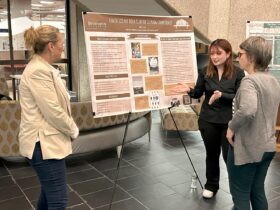This fall, the Libraries were awarded a Council on Library and Information Resources (CLIR) Recordings at Risk grant for our Learning from Legends: Reflections on the 1960s Collection project. The grant award is for $16,552.50 and was one of only 16 selected from the total of 51 applications.
The year-long pilot project entails preserving, digitizing and publishing a gift collection of original recorded interviews with 278 civil rights leaders, activists, women’s rights leaders, politicians and Vietnam War veterans from the 1960s. The digitization of the recordings will make these historic materials broadly available to researchers and the public.
Once the audio interviews are converted from microcassettes to digital files, we will hire five students from the Equal Opportunity Program (EOP) on campus to participate in an internship. The students will prepare metadata for the files and make minor edits as needed. In the future, another cohort of students will select excerpts from the digital files and combine them with photographs, short biographies of the individuals interviewed, and other educational content and bring the files to publication as Open Educational Resources (OERs).
The Learning from Legends: Reflections on the 1960s Collection is part of the Libraries’ Center for the Study of the 1960s which is the nation’s first virtual center promoting excellence in research, scholarship, teaching and programs in the social, cultural and political history of the United States during the 1960s. The center is made possible through the generosity of alumni Stephen R. McKiernan.
The Learning from Legends: Reflections on the 1960s Collection is supported by a Recordings at Risk grant from the Council on Library and Information Resources (CLIR). The grant program is made possible by funding from The Andrew W. Mellon Foundation.

CLIR is an independent, nonprofit organization that forges strategies to enhance research, teaching and learning environments in collaboration with libraries, cultural institutions and communities of higher learning. To learn more, visit www.clir.org and follow us on Facebook and Twitter.





